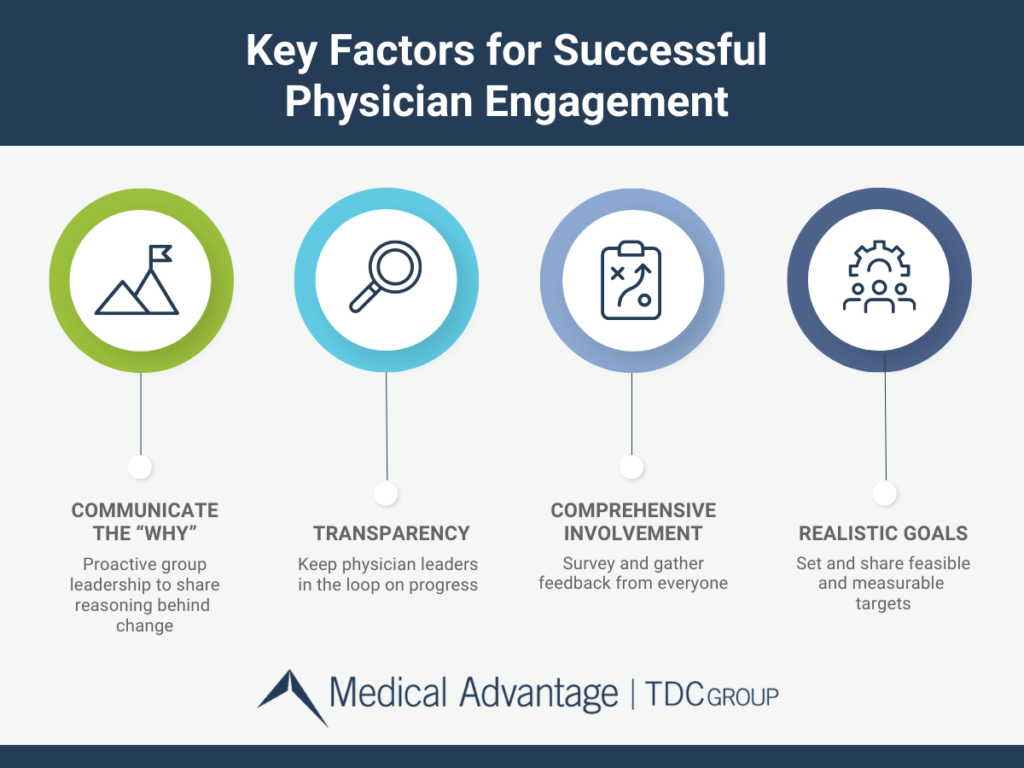A healthcare system is a mosaic of many talented professionals from medical, technical, and business backgrounds. When each corner of the organization has their heads down, tending to their respective responsibilities, executive leadership must find ways to build a bridge between the business and medical departments, especially when major change is underway.
In a healthcare system, every decision is consequential, so group leadership (C-Suite in particular) would be remiss not to gather clinician input to guide the process toward a prosperous outcome. Guidance from hand-picked physician champions (or physician leaders) is instrumental in the success of any significant undertaking, and such engagement must happen early on.
What is Physician Engagement?
With a keen awareness of the needs of patients (your customers) and a wealth of experience in the intricacies of healthcare delivery, clinicians possess an invaluable perspective that better informs decisions at the business level.
Physician engagement strategies involve the selection of clinicians who can best serve the planning and buy-in process for any transformational project. Aspirationally, these are vocal advocates who are supportive, influential, and diligent advocates for the interest of their peers.
“I have seen physician engagement serve as an essential ingredient for any major initiative that is being developed and ultimately implemented by a health system. In essence, it’s a change agent that can build momentum and bring about a cultural alignment supporting the initiative.”
Medical Advantage Executive Healthcare Consultant Monty Pate
What Kind of Projects Are Physician Leaders or Champions Involved In?
Physician leaders are enlisted to help with the development and rollout of transformational initiatives such as a new electronic health records (EHR) implementation, construction projects, compensation model structure, plus consulting or private equity engagement.
Physician engagement is a critical catalyst for the success of any major initiative within a health system. Physician champions can drive momentum, buy-in, and the cultural alignment needed for a successful outcome. You will find them participating in committees and work groups that are involved in major endeavors.
The Profile of a Physician Champion or Leader
While you may not find a clinician within your organization who ticks all the boxes of physician leadership skills, there are some criteria to keep in mind as you consider who best fits that role. Characteristics of an effective physician champion or leader are:
- A broad appreciation and global perspective of all the elements that make up a healthcare system: budget, staffing, clinical treatment, patient engagement, patient loyalty, informatics, telehealth platforms, compensation, quality measures, etc.
- Respect among their peers and dedication to represent their interests to executive stakeholders; additionally, they are effective in communicating at the peer level to promote project transparency
- The capacity to take ownership and collaborate with stakeholders to be part of the solution
- A temperament of being honest, frank, and skillful at providing constructive communication
- A holistic mindset – the best interests of the overall health system guide their actions and intent
- Willingness to speak up when they find gaps in logic, flawed assumptions, and issues that may be in the blind spots of business-end stakeholders
When you are fortunate enough to have more than one physician leader on deck to support the advancement of initiatives, diversity is key. By appointing leaders from differing areas of expertise, you cover more ground with each physician bringing rich insights to the table.
When Should I Engage Physicians?
To make the most sensible decisions and avoid costly mistakes, it is best to enlist and engage physician leaders early in the timeline. By doing so, you gather consequential insights that keep projects on track. Their experience and way of thinking raise concerns or issues you may otherwise overlook – some being critical factors that could end up being problems down the line.
For example, a healthcare system is building a new expansion. During a weekly call, the project team decides to have a few doctors put on hard hats and tour the construction. Following along with the floorplans in hand, the doctors were in dismay. This layout would drastically disrupt the effective clinic procedures they have used for years.
After making a case for how many problems this layout would cause them, the project management team faces a dilemma where reversing the construction would bring it over budget and behind schedule. Had they brought the floorplans to the physicians before they broke ground, this headache – and associated cost – could have been avoided.
The sooner you select and engage physician leaders, the more effective your project will be.
What is at Stake Without Physician Engagement?
Aligning the organization to the needs of patients and the medical teams brings credibility to the project. Physician leaders need to know the “why” behind any projects and can help consultants and administrators better articulate this why to stakeholders on the medical side of the initiative.
Fear of the unknown combined with a lack of transparency concerning initiatives creates a “rumor mill” that can easily generate negative sentiment and false narratives. When executive leadership makes major decisions in a vacuum without consideration for how those choices impact the medical teams and patients, this can sow discord, breed apathy, and lower morale.
Ultimately, this disconnect inhibits buy-in from clinicians and the medical staff they work with. Friction from a lack of buy-in puts the success of the project or initiative at grave risk. Low morale easily reduces care quality which puts the reputation and profitability of the health system in jeopardy.
Providers just want (and need) a seat at the table for major decisions that impact the health systems they serve. Acting as representatives for the medical teams, physician leadership also helps the care staff concerns and expectations to be heard as well.
“The biggest takeaway here is that physician engagement creates value for whatever the undertaking may be. Whether it’s a private equity transaction, a consulting engagement, or an internal project within the healthcare enterprise, gaining that element of understanding and trust from your physicians is a critical success factor. You cannot start the conversation too soon with your physician leaders.”
Medical Advantage Project Management, and Medical Practice Solutions Consultant, Celina Dusseau
Physician Engagement Case Study
The following example offers clear evidence of how buy-in yields substantial rewards for executives, providers, and patients alike.
A large hospitalist group sought to improve quality outcomes for an entire major health system located in the southern United States.
The Goals
Group leadership sought to work with each campus and 80+ hospitalists on an incentive compensation model. The intention was for the new structure to incentivize providers to prosper the system’s quality goals.
- Move the needle in a positive direction on quality outcomes and bring value to the system
- Improve inpatient quality
- Create a compensation model that aligns with quality goals
- Reduce length-of-stay
- Reduce (emergency department) ED visits
- Reduce readmission rates
- Implement a compensation plan in alignment with health system objectives
Key Factors
The key ingredients for a successful rollout:
- Communicating the “why” – Group leadership was proactive to communicate that the reason behind the updated compensation model was to create a “win-win” situation where care quality improved and providers were rewarded for it
- Transparency – Physician leaders were kept in the loop about developments and ongoing dashboard reporting provided timely data about how well things were progressing
- Comprehensive involvement – All hospitalists were surveyed for input and ultimately, one physician leader was appointed for each of the initiative’s goals
- Realistic goals – The project management ensured that the goals developed were feasible and indeed measurable by timely data

Successful Outcome
The most significant result of this project was how successfully recruiting high engagement from the provider group fortified support for the health system’s objectives. This garnered intrinsic buy-in, as the model was created with the help of the providers themselves.
Summary of Physician Engagement
Making decisions in a vacuum without the wisdom of clinicians and the help of physician champions can jeopardize the success of any major project or initiative such as group acquisitions, building new locations, implementing an EHR, and more.
By engaging physician leaders early on, you can avoid mistakes, ensure buy-in, and protect overall morale. By partnering with those who provide care, you avoid the negative impacts of major change that could have an impact on patient care quality and instead obtain critical feedback needed for the project’s success.
Make Acquisitions, Projects, and Initiatives Successful with Our Experienced Consultants
Any major change in a health system or organization cannot be successful without careful planning and well executed project management. Our consultants bring to the table diverse expertise in healthcare. Specifically, we are prepared to help you create a winning strategy with:
- Customized healthcare reporting dashboards
- Best implementation of EHRs
- EHR optimization
- EHR training built for long-term success
- Quality consulting (such as Merit-Based Incentive Payment System, or MIPS)
- Revenue Cycle Management (RCM) optimizations
Ensure the success of your future health system plans. Connect with a Medical Advantage consultant today!





